"Checkpoint" by John Leary
"Bill had been working checkpoints with Carson for a week, and so far no one had come up red. A few people had come up yellow... but it turned out those people had just been having a bad day."
SO excited to get to feature this John Leary story today. This one is an exemplar of so much of what I often love in a story — smooth, precise sentences; evocative, perfect worldbuilding, ideas a plenty. What I maybe most love about the story, and what has most stuck with me since first reading it in the submission queue, is the way it builds and lingers in tension — giving me an actual physical response while reading — and also the surprises. The story turns at least a couple of times in ways that still catch me a little off-guard with every reread, but that open up the story and bring such delight every time. The kinds of moments, and responses to them while reading, that are such a big part of why I so love short stories.
I first published John in Hobart #3, way back in… 2003, I think it was? (That can’t be right, surely neither of us are that old…) It’s a real treat to work with him again and to get to share this story with you all!
—Aaron Burch
“Checkpoint”
Carson was telling Bill about an app that Carson’s cousin had designed. Carson said it would disrupt the market for personal firearm simulacrum security solutions. Carson held his phone out toward Bill, showing him a button Bill could push in the app to make the phone sound like a gun firing. You could choose the kind of gun you wanted it to sound like.
Bill said, “Huh.”
Carson was very enthusiastic about the product. He said it was going to be huge. It was going to go viral. All his cousin needed was money to market it. But no one these days had any money.
“But, I mean, you have some money,” Carson said.
Bill looked away.
Carson asked, “Do you want to try it?”
Bill said, “Uh, maybe later?” He missed Pharaoh and Garcia. Also, striking it rich from making an app—was that still a thing?
Next at the checkpoint was a car with a young woman in it that they waved through, then four other cars that they waved through, then two cars they stopped and asked to review documentation, then six cars they waved through.
Domestic checkpoint work was a better assignment than being overseas, everyone said. Bill was closer to home, or at least closer to his sister, so that was good. Guys at Base said that the best assignment of all is being on a C-suite security detail. You basically escort an executive around all day. The food was good because you ate where they ate and there wasn’t much to do except a few security sweeps a day and maybe some convoy work.
Even though the gear and body armor he wore was the same as he wore overseas, it felt heavier and more burdensome in the heat. Plus, that summer everything was fraught. Protests seemed to be happening every day.
People protested about lockdowns and vaccinations, others protested about the police killing people of color, and then people counterprotested those protests. Bill and everyone else at Base had heard rumors of a small arms exchange between DOJ assets and Homeland Security assets. Everyone said it was just mistaken identity—protestors on every side these days all seemed to be wearing camo, tactical gear and insignias—so it was understandable, but further evidence of the fracturing of everything. He’d heard about the gun battle but it wasn’t in the news so he wasn’t sure if it was true. He'd asked Carson if he thought that story was true, but Carson had said, “I’m not a news guy.”
What did seem to be true was that ProTechTec was telling federal and state governments that they could eliminate the issue of different departments fighting by consolidating security under a single umbrella. Up until recently, all of ProTechTec’s big contracts had been overseas.
Then came a bearded man driving a red hatchback that seemed to be filled with boxes and blankets. Carson motioned for the man to stop. Bill positioned himself in the driver’s blind spot on the passenger side.
The man stepped out of his car, which already meant this would be a difficult stop. The man asked Carson if there was a problem. Carson’s phone was in checkpoint mode, so it automatically recorded the man’s voice when he asked this. Carson pushed a button and sent the man’s voice recording to their database for vocal-band matching against known bad actors.
Carson asked the man for his documentation, and the man walked around the car to the passenger side door. He opened the door and lunged for the glove compartment. Bill and Carson were suddenly very tense. Both their phones pinged. Bill glanced at his. Carson didn’t want to risk taking his eyes off the man to look at his phone so he looked at Bill. Bill mouthed, “Yellow.”
The man’s voice-band gave him a rating of “yellow.” Green meant he was fine and could go on his way. Red meant he should be Detained. But yellow was the worst, at least to Bill: yellow was somewhere in the middle. Generally, it meant they were to wait for further instructions and review the man’s documentation.
Bill had been working checkpoints with Carson for a week, and so far no one had come up red. A few people had come up yellow, and several of them had looked suspicious, but it turned out those people had just been having a bad day.
The checkpoint that day was on a narrow two-lane road bordered on both sides by farmland. The road was the lone artery between a snug lower-class suburb and the highway into the city. It was morning and the greens in the fields were still dew-y and fragrant. Clouds clustered in the middle distance like spectators. Traffic was nearly all traveling in one direction, so Bill could stand in the opposite lane comfortably. To his left was a fallow field. To his right was a field full of crops, and beyond that, several rows of military tents, looking very neat and tidy in the disheveled surroundings. Carson had told him they were tents of the Senegalese army, visiting for military exercises.
As Carson was reviewing the man’s documentation, two small faces appeared at the right rear passenger window of the red hatchback. Two young girls—they were maybe six and four—waved at Bill. Bill waved back. Then the girls were holding up two small stuffed animals—an octopus and a crab—and were making them do a little dance for Bill’s benefit. He moved his hips and shoulders a little, trying to follow the dance, which caused a riot of hilarity between the girls.
One, then two, then three drivers in the cars lined up behind the red hatchback leaned on their horns. More cars were pulling up and stopping behind them.
Carson was calling in a discrepancy on the bearded man’s documentation. Bill thought he maybe saw several shadows moving through the treeline at the edge of the field over the man’s shoulder. He asked the man to get back into his vehicle. The man said he didn’t have to. He said he knew his rights. He said Bill and Carson were only government contractors—not Army or National Guard or police—and therefore the Constitution said he didn’t have to obey them.
Over the past week quite a few people had mentioned to Bill and Carson things the Constitution said they must or must not do. Bill had remarked to Carson that lockdowns had given everyone a lot of time to study the Constitution. Carson thought that was funny.
The girls in the red hatchback were now pushing and pulling their cheeks, making funny faces at Bill. He smiled at them, though it took some effort, and they couldn’t see his mouth behind his mask.
Carson seemed to be on hold. He was standing about 10 feet in front of the red hatchback, watching the man carefully. The man kept putting his hands in and out of his pockets. Carson did the tiniest of nods toward Bill, who put both hands on his rifle, ready to unshoulder it if necessary. The safety was on.
People had stopped honking and several were exiting their vehicles. Three of the people, two men and a woman, carried holstered firearms. An awful lot of citizens carried firearms these days, so Bill was trained for this. He turned toward the people and held up his arms and calmly asked the citizens to return to their vehicles. They continued to approach, then they were clustered around the car just behind the red hatchback. Some seemed to be assessing defensive positions.
The bearded man had crouched behind his red car. Bill couldn’t see him. Carson asked him to stand, but he did not.
Bill could hear his own voice break slightly as he again asked people to return to their cars. They did not. More people from distant cars seemed to be coming forward. They were crouching behind vehicles, edging toward him. Cars were now blocking both lanes. People were yelling things. They were sick of this. Why isn’t the line moving? What’s the holdup? Do you people even know what you’re doing? We know our rights. You can’t treat us like this.
The funny thing was that Bill had learned just the day before that they weren’t really checking anything. Not for real. There were a bunch of teams out doing checkpoint work, but they were all part of a company-wide initiative to develop a better checkpoint product, to develop best practices for checkpoint techniques and procedures. Bill knew if he told that to the people yelling at him they wouldn’t think it was funny.
Three guys stood up and walked toward Bill. They weren’t yelling and they looked calm. They had weapons. Bill didn’t like the look of them. He took several steps backward, unsure of how to proceed.
Two gunshots crackled through the air. Bill ducked, then turned to see Carson holding his phone in the air. He had used the warning shot app.
At the sound of the gunshot, the citizens stopped surging forward, and then soon dispersed as two ProTechTec mini-drones arrived and buzzed low over the waiting cars. People seemed to be afraid of the drones. Everyone returned to their vehicles. Carson received clearance for the bearded man, and Bill and Carson waved the next 17 cars through.
The sun had dried the dew and the day was getting hotter. Bill could smell the rich earth on either side of him. The plants in the field looked like peas or maybe lettuce.
Then a man came toward them, striding quickly across the field dressed like an officer in the Senegalese army. He appeared agitated. As he approached Bill he shouted, “This is what you do here? You shoot the tents of friendly armies?”
Bill and Carson both said, “It was an app.”
Then Bill said, “We didn’t actually discharge a weapon.”
The officer had reached Bill and was standing before him. He was a big man - they were about the same height. “Then how do you explain this?” He showed Bill a scrap of khaki tent material. It had a hole in it, like a bullet hole.
Bill stammered, “It’s not possible… I don’t know…”
The officer’s face was stern and concerned, but then he broke into a wide smile. He laughed. “That is okay, my friend. These things happen to anyone.” The officer’s name was Simon, and he was a captain in the Senegalese army. A wide-faced man with broad shoulders and a faint mustache, he said his mission in the US was to observe how ProTechTec operated. He spent the rest of the workday observing Bill and Carson.
Simon was pleasant, asked interesting questions, and didn’t get in the way. When they were done, Simon asked Bill to join him for dinner. Bill didn’t have any plans, so he texted his supervisor for permission, and then agreed. Simon suggested that Bill meet him at Simon’s apartment.
Bill asked, “You don’t live in the tents?”
Simon laughed. Bill was starting to like his laugh. “Yes! But no. The tents are mostly decorative and for enlisted men.”
Simon’s apartment was not far from Base, so they agreed to meet at 6:30.
On the way to Simon’s, Bill bought a bottle of Chianti at the ProTechTec commissary. Buying something, even it if was small, always made Bill feel a little better. Buying was a concrete transaction, contrasting with the rest of his days, which were mostly filled with a not-knowing, a tentative unspooling of time and events. He knew the feelings came from the uncertainty of working at a checkpoint, the uncertainty of living in a city, but that knowledge didn’t make it any easier.
Simon lived in a block of apartments in a medium-to-nice neighborhood not far from where his sister used to live before she moved into a higher security district closer to headquarters. Simon told Bill he had rented a two-bedroom apartment on the naïve belief that his wife and daughter would come visit him while he was stationed in the city, but so far no approval had been given for them to visit. He wasn’t quite sure when he would return home. Things kept happening, he said. There was always more to learn.
“And then of course,” he said with a smile, “There is always the matter of people shooting up our tents!”
Bill laughed, a little.
Simon’s apartment comprised a small living area that opened up to a kitchen, with two bedrooms off to one side. The walls were white and the carpet was beige. The only decoration was a photo of Simon and a woman Bill thought must be Simon’s wife in a wooden frame on the counter next to the stove. The only furniture was a sofa and a square plastic table with three wooden chairs—Simon didn’t seem to spend much time in his apartment.
Bill sat at the table and opened the Chianti.
Simon announced that he would cook a chicken dish, but it was not the best chicken dish. “The best chicken dish,” he said, “Is Yassa Poulet.”
Bill asked “Why don’t you make that?”
Simon sighed. “I do not have the recipe. My wife makes it the best, anyway.”
“Are there recipes for it on the internet?”
“Yes, but my wife has strongly cautioned me not to use them. Too many of them have been corrupted—there is poison in them.”
“Well, couldn’t we make the chicken, but just leave out the poison?”
Simon laughed, “Yes! Ha! But no. Did you know that in 18th century France, people thought tomatoes were poisonous because the acid in tomatoes leached into the lead in their plates and made them sick?”
Bill did not know that.
They clinked plastic cups of the wine and drank.
Bill cut an onion while Simon dredged pieces of chicken in a flour mixture. Bill said, “It was nice of you to come over and say hello to us today.”
Simon laughed, “Yes! But I came over under false pretenses, as you know. I was hoping to meet you. Our local liaison officer told me you are a hero.”
Bill said, “What? No!” Then he realized what Simon must be talking about. “I mean, I just got… well, my unit lost me one time.”
Simon said, “How can that be?”
Bill looked at Simon and said carefully, “Um. We were testing something.”
Simon smiled. “SunDown? Your company was testing SunDown?”
“You know what that is?”
“Of course! Your company has been trying to sell it to my army for many months now.”
Bill said, “That’s good, I think. So, SunDown is a, um, proprietary terrestrial array. It’s for GPS-denied environments. And we were using it, and there was a gap or something in the coverage. And we were out on a mission in the Atlas Mountains and because of the gap not everyone got accounted for. Or, I mean, everyone did but me. So I was sort of left out in this mountain desert place, for almost a week before they were able to find me again.”
“That is quite a story! How did you survive?”
Simon seemed to be preparing a lot of chicken, more than the two of them would be able to eat.
Bill said, “It wasn’t tough. I mean, it’s what we’re all trained for, right? Find a water source, find shelter, etc. But I didn’t eat much besides three Nutribars and some plants for a week, so I got kind of skinny. And I found a cave that was used as some sort of base by a hostile force and just before my guys found me, I was exchanging sporadic rifle fire with them, so that happened too.”
“You were shot? I heard this.”
“Not really. Something grazed my arm. Guys seemed to make a big deal out of it, but I didn’t think it was all that much. I mean, that’s sort of what we do. Guys probably get shot in your unit all the time, right?”
Simon said he was sorry, but no—no men had been shot in his unit in conflict in the last 25 years. He told Bill he was proud of that fact. He stood and poured some oil into two frying pans—one for the chicken, and one for the onions. In a pot he set some rice to boil. Then he said, “Excuse me, I do not mean to press you on this topic, but I understand you received a promotion?”
“Well, sort of.” Bill shifted in his chair. “I mean, I got taken out of the field, which I guess is good, but I miss the guys. But it’s nice to be back in my own country. And I live closer to my sister. Well, I live closer to my Dad and brother too, but they still live a long way away. My sister is only about a half hour drive from my place.”
Simon nodded. “That is good. Family is important. It is the most drastic and frustrating part of our lives. And the most important.” He poured each of them more wine.
“I guess,” Bill said. “They also told me that they might give me some money.”
“Your family?” Simon was standing at the stove but turned to face Bill.
“No, the company. ProTechTec. I mean, SunDown didn’t work for me, my comms went out, none of the locators were working on me or at the base, and the whole episode was caught on my body cam and they don’t seem to be 100% sure where the footage is. Anyway, they told my sister—she works for the company too—that if I sign some papers, they’ll give me some money. She’s got a lawyer looking at it all.”
Simon nodded slowly as if to say: Yes, that is the way of the world.
They ate fried chicken with mustard sauce, rice and sauteed onions. It was all delicious. When the bottle of Chianti was empty, Simon opened another bottle of wine he pulled from the cupboard beneath the sink. They drank that bottle more quickly than the first.
Over dinner, Simon told Bill about his cousin. Simon’s cousin was starting a new business, making 3D-printed gloves.
That sounded interesting. But then Bill said, “Do many people really use gloves in Africa?”
“Ah! Yes, a very good point!” said Simon. “They are for export!”
They talked a bit about different pairs of gloves they’d each had in the past. Work gloves, ski gloves, leather motorcycle gloves. And there were different types of work gloves. Industrial gloves for working with solvents. Or gardening gloves that prevented the ingress of thorns. Fuzzy pink mittens on schoolkids. Warm gloves in the winter for just when you get outside and the only thing exposed to the cold bitter winter winds is your nose and hands. Driving gloves. Were oven mitts gloves? Bill realized he was little drunk. They were both a little drunk.
Simon leaned forward and touched Bill lightly on the knee. He said, “William. Would you like to invest in my cousin’s glove company? I can ensure that you will get excellent terms.”
Bill said, “Well...”
Simon’s expression changed. He said, “I am sorry. I have put you in a difficult position. Think of it no more.” He stood and cleared the table, and Bill helped him. When they had cleared all the plates, Simon went to one of the bedroom doors and opened it. He seemed cheerful again. “Come! Look!” he said. “There is something in here that I want to show you!”
When Simon turned on the light in the bedroom, Bill stood at the door and wasn’t entirely sure what he was seeing. At first, he only saw bright colors and edges and shapes that seemed to be moving, very slightly. But as his eyes adjusted he saw that nearly every inch of the floor—there was no furniture—was covered in delicate tissue paper sculptures. No, they weren’t exactly sculptures.
Bill said, “Kites?”
Simon laughed. “Yes! Kites!”
The room was filled with elaborate tissue-paper kites. Bill saw a kite in the shape of a castle, one that was a dinosaur, another a stadium. A locomotive, a cathedral, a cypress tree. Elaborate delicate creations that all seemed ready to float in the air. Simon lifted a few off the ground and they were so light, they floated before him and seemed to hang in the air before slowly, gently, falling back to the carpet.
“All of them, they are like, kites of heavy things,” Bill observed. “Is that part of the point? Like you design heavy things but then make them float and fly? That seems like a pretty cool hobby.”
“Yes!” Simon nodded enthusiastically. “You have the wisdom of the good observer. Although like nearly every hobby, the early stages are when one must learn about materials and airflows.”
Bill tilted his head and Simon said, “I am kidding, of course. You do not need to learn those things before—you learn them as you build the kites. Trial and error. But it is a good hobby. Because there are no limits to how creative you can be. You can make great grand structures. My brother built a replica of the Hagia Sophia in his backyard and successfully flew it, nearly 50 feet off the ground.”
“Do a lot of people do this in Senegal?”
“No, it is more popular elsewhere.” Simon shook his head sadly. “So many of my countrymen would want a new scooter, and that is their hobby. Or if they are big shot, they will buy a house and that is their hobby. Or they will spend all their money on a woman, or several women.”
“Well,” Bill said, “I guess you’re lucky you already have a wife.”
“Yes! Though—and I hope this does not offend you—I would be willing to take your sister as a second wife.”
Bill thought maybe he should sober up.
“Do you have any, like, tea or anything?”
Simon went to the kitchen to put the kettle on the stove for tea and Bill lifted a kite. It was in the shape of a clipper ship, a tall three-masted ship made of tissue paper. The sails were bright magenta. The hull was a vivid sea blue. Bill thought it was the most handsome thing he had ever seen.
It looked heavy, but he lifted it without effort and then it seemed to impossibly float in the air before him. to hang in the air just above his fingertips. He blew a small gust of breath into the sails and the ship glided upward, gently bumping the ceiling and capsizing a little. He blew again and it righted itself and sailed into the other room, its bow dipping and rising in imaginary waves. He followed it and called to Simon, “Look!” and blew again, sending the ship onward toward Simon.
The ship-kite landed on the stove and caught fire.
Bill rushed to grab it and carry it away from the stove but it was burning and it escaped his grasp and sailed into the bedroom where it lit the other kites on fire.
Soon Bill and Simon were standing in front of Simon’s apartment building watching it burn, watching massive clouds of black smoke billow skyward. Occasionally they saw orange flames. Bill called ProTechTec and they said they would prioritize his call and make sure a fire company came soon.
“Yes so,” Simon said, as they watched the roof of the apartment building collapse. “William. My cousin’s glove business. Would you consider investing?”
Bill turned away from the burning building. The smoke was hurting his eyes. He thought, “Invest?”
Simon said, “Wait. Before you answer. Think who you will be. Who you want to be. You can be these poor souls milling through the checkpoint. You can be the hungry soldiers working at the checkpoint. Or you can be the man in his private jet who flies high in the sky over the checkpoint. He looks down and sees the checkpoint. He is wearing sunglasses.”
Bill was surprised how fast he nodded. “Yes,” he said. “Of course I’ll invest.”
STORY:
Stories by John Leary have been published in the Gettysburg Review, OneStory, the Mississippi Review, and elsewhere.
*
ART:
Matthew Austin is an artist & designer from Maryland, he can be reached at www.matthewaustin.net.
Next Tuesday, we’ll feature a bonus interview with John about this story, and chat about our shared memories and history of some of the early days of online lit journals from 20-25 years ago.

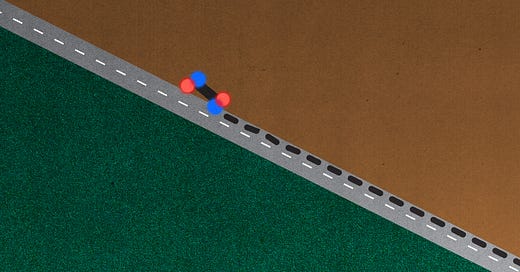


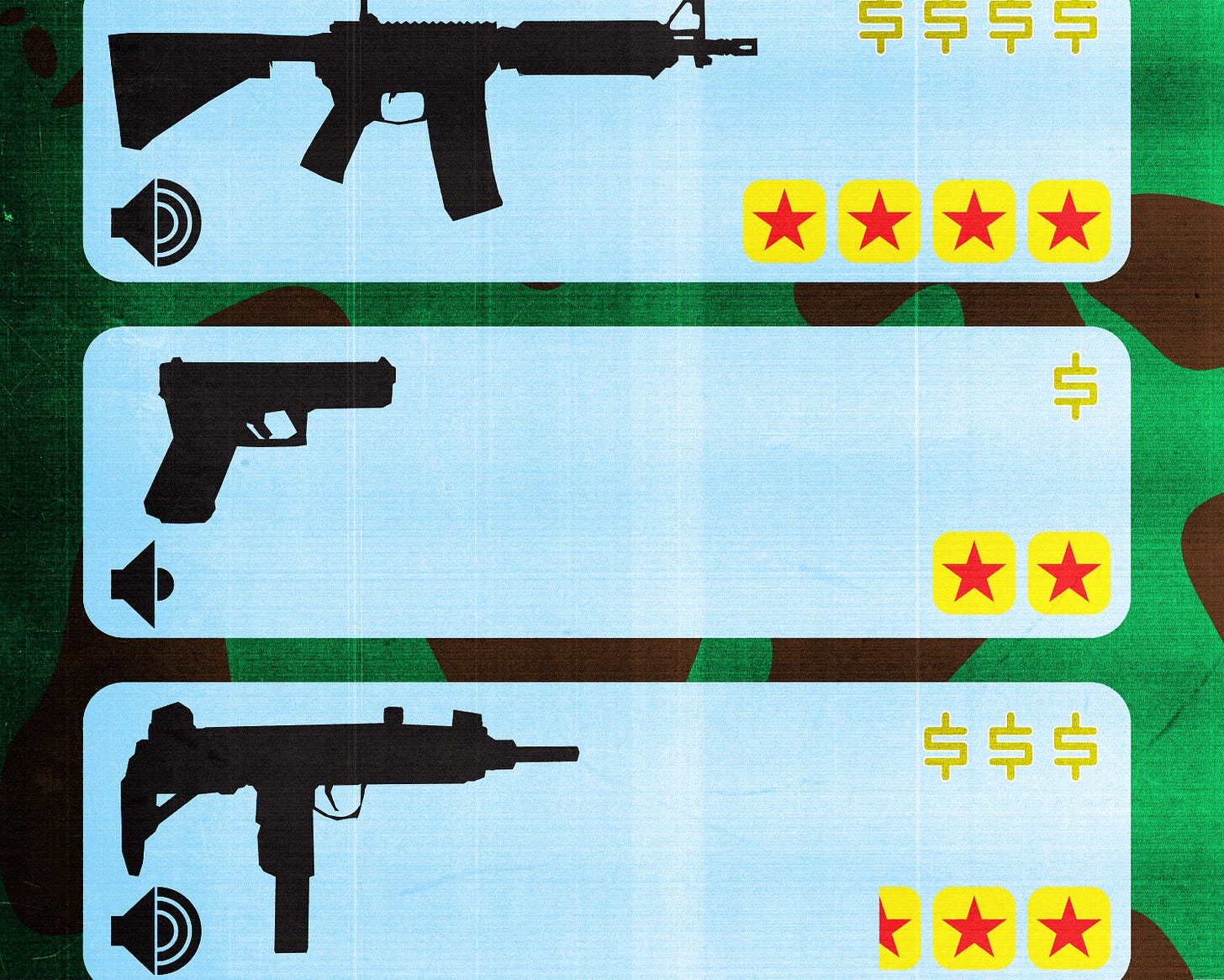
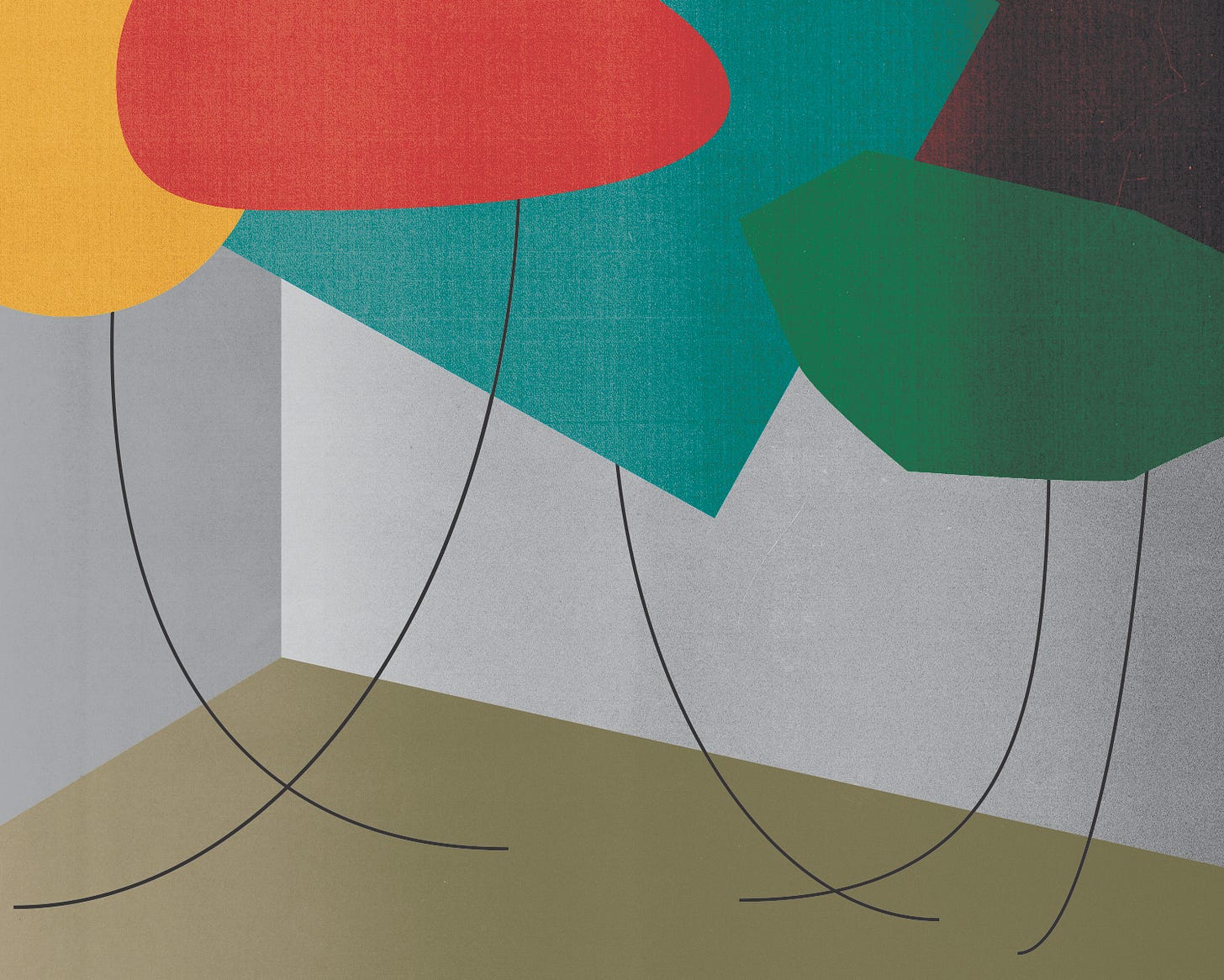
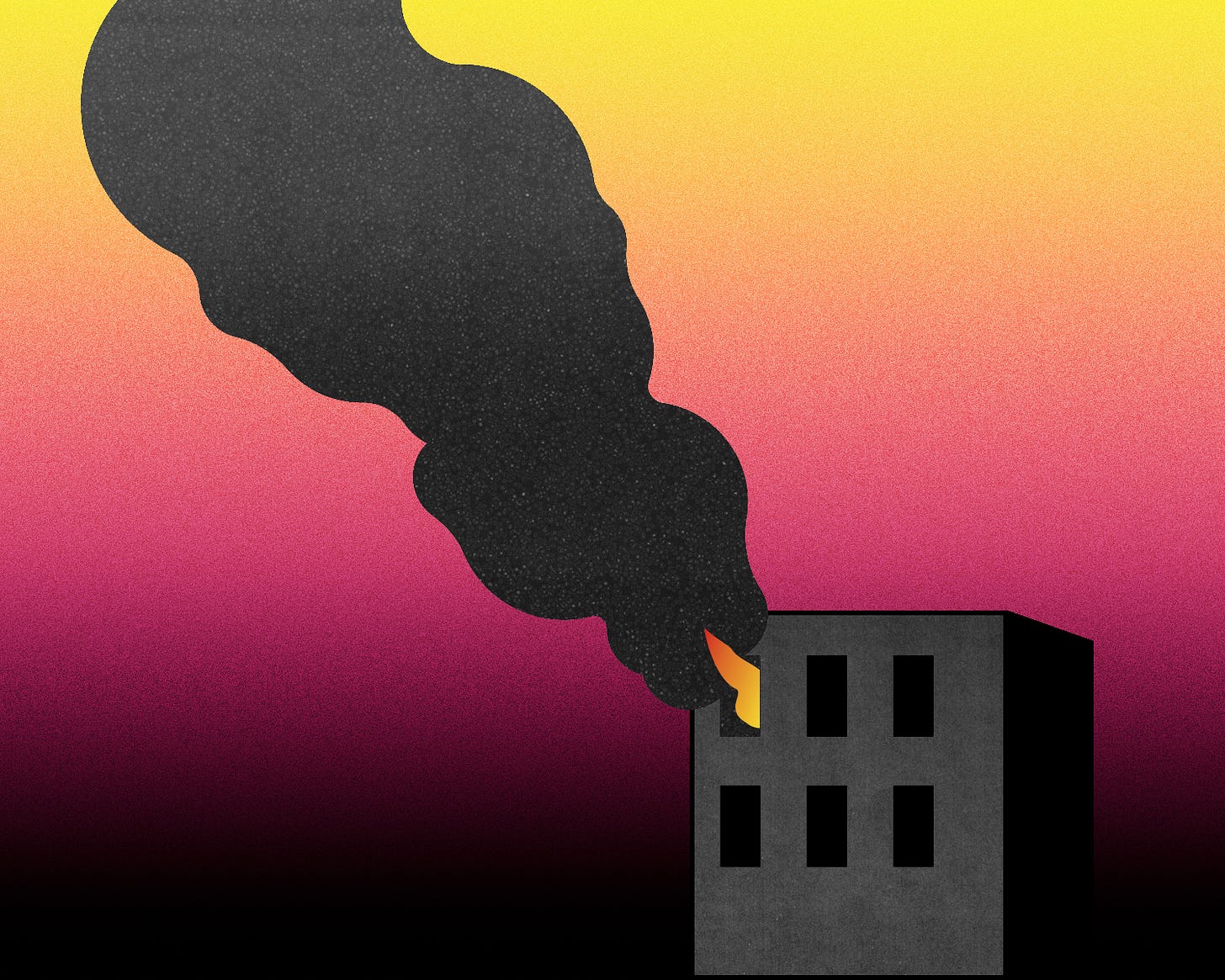
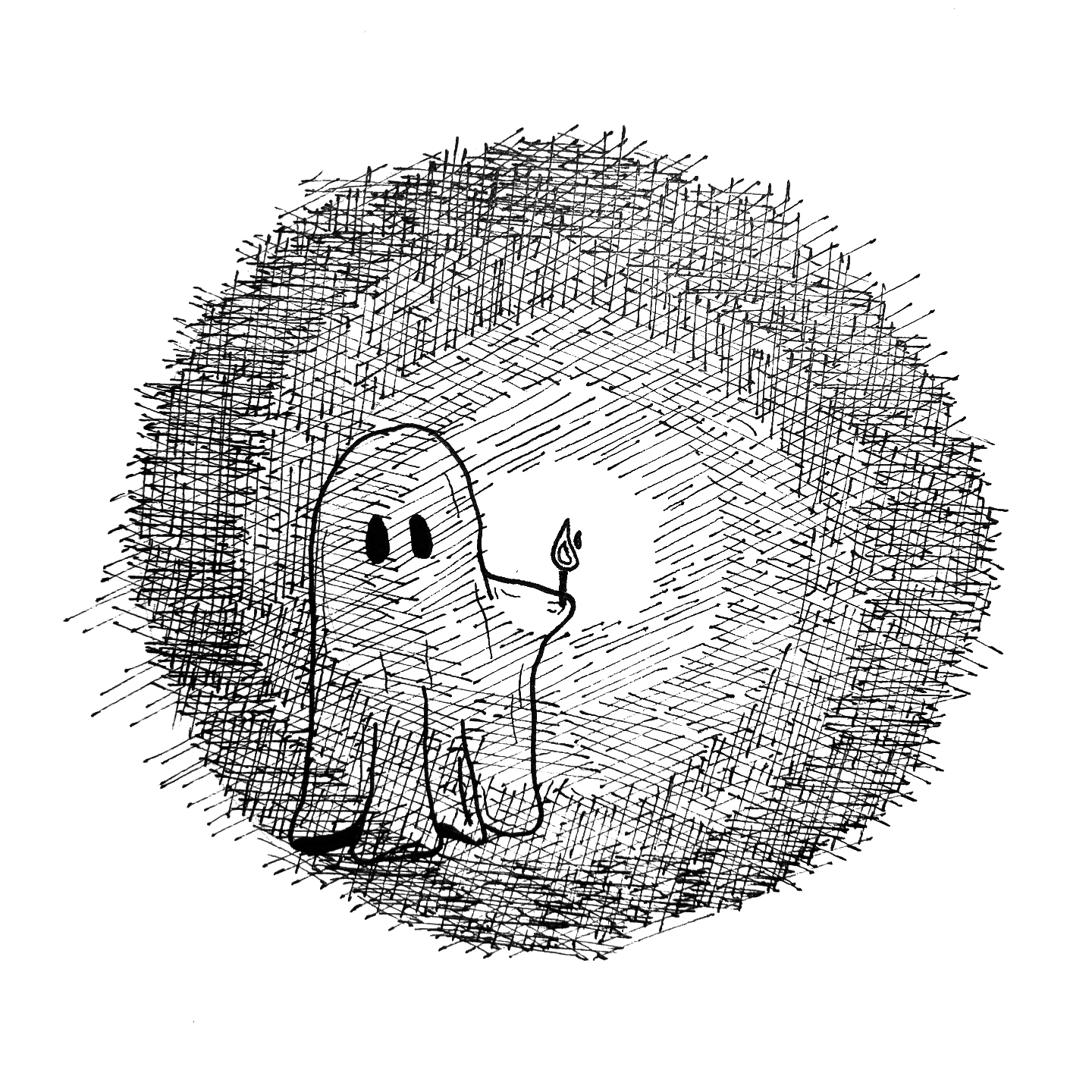
Great stuff, I love this kind of winding, flowing narrative.
A sidewinder of a story - moving in unexpected yet natural ways!